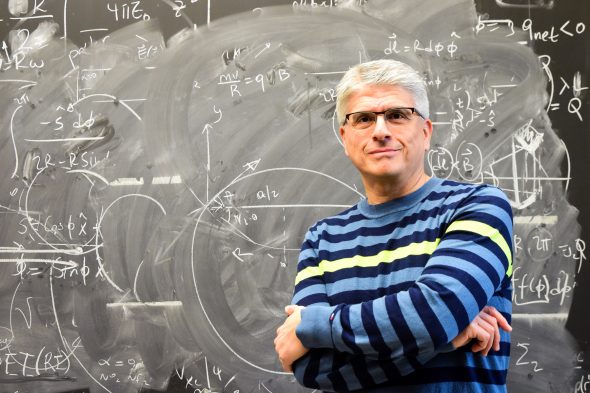Excellence in Teaching: Serdar Ogut
Each year, UIC honors some of its most dedicated and outstanding teachers with the Award for Excellence in Teaching. The winners, who receive a $5,000 salary increase, are selected by past recipients of the award from nominations made by departments and colleges.
Years at UIC: 17
What does it mean to win the Excellence in Teaching Award? What do you teach?
I have taught at various levels, from introductory 100-level courses to senior undergraduate physics courses, as well as required and elective courses at the graduate level. Though AET is a peer-reviewed award, I view it primarily as a testament to my students’ appreciation of my student-centric teaching and mentoring methods, as well as the strong relationships I have built with them based on mutual respect. I have always thought that it is not so much the comments and feedback that a professor gets from the A- and B-students (as important as they are), but the comments of those students who have not done as well in the courses, that determine where the professor stands in the spectrum of teaching excellence. If you are teaching reasonably well, it is relatively easy to receive high praise from students who are performing well, but it requires a great deal of devotion and time investment to be appreciated by students who are struggling or even failing in your courses. I view my AET award as a recognition by my peers that my efforts to reach out and educate my students from all walks of life have, by and large, been successful (though I am sure, there is always room for improvement).
How do you engage students in your courses?
I strongly believe that students need to be driven out of their comfort zone to attain their unflinching best. At the beginning of each semester, I am very honest with my students about the demanding nature of the courses they will be taking with me, but I also let them understand that I will be there to individually help them when they need it. I present a challenging curriculum; I do not organize my class around asking simple questions. I do not practice grade inflation because it insults the intelligence of our students. To help maintain quality instruction, I do my best to get to know my students with an open-door policy. Even in 100-level courses with more than 100 students, I made a point of learning all my students’ names by the first few weeks (a good memory and visiting them in their labs helps!). In smaller classes, I ask the students to come to my office to introduce themselves personally, and I also visit them in student lounges. When the students know that I care for them and about the quality of their education, they almost always tend to return the favor by trying their best to achieve the goals they have set in my courses, no matter how high the bar might be.
What do you enjoy most about teaching at UIC?
Teaching physics at UIC is a challenging and most enjoyable endeavor. We teach students from varying backgrounds, those with little high-school physics knowledge as well as those who are exceptionally bright and think like scientists. The challenge is to choose and present the material in such a way that you can reach out to everyone and still find creative ways to engage and challenge the most gifted students. Striking this balance requires a great deal of time investment in lecture, homework and exam preparation, and it provides me with a most meaningful way to contribute to the quality of all my students’ education. Sometimes preparing one homework set or exam question literally takes days for me, but I have found that such efforts to sustain stringent goals for myself in teaching excellence have led to deep personal and professional fulfillment.
What are your research interests?
My research is in computational materials physics. I use and develop parameter-free (first-principles) methods to understand and predict electronic and optical properties of a variety of materials, typically in relation to their interaction with light and other external probes.
What is your advice to students who just graduated Dec. 15?
Be yourself, work hard, behave honorably, and always strive to do the “right thing,” no matter how hard, inconvenient or unpopular you might find it to be. Your gut feelings will almost always lead you to know what the right thing is.

